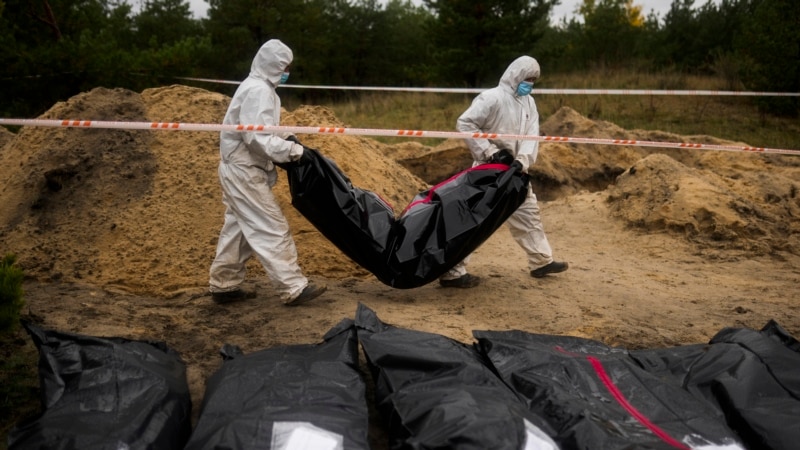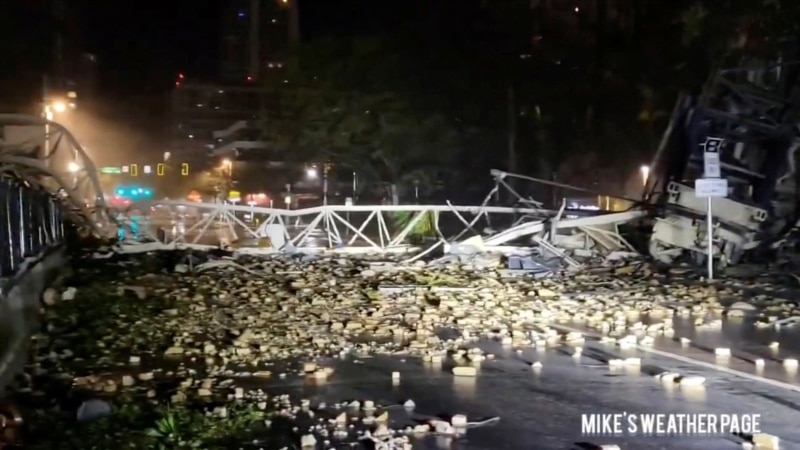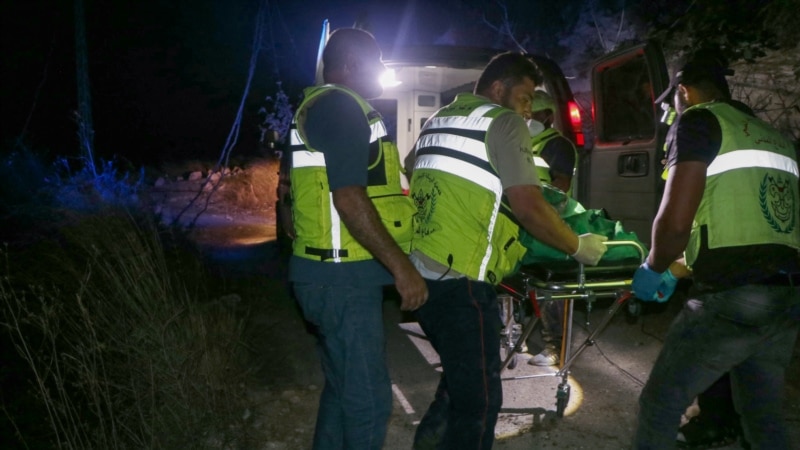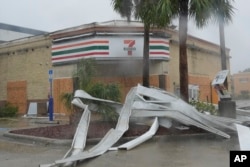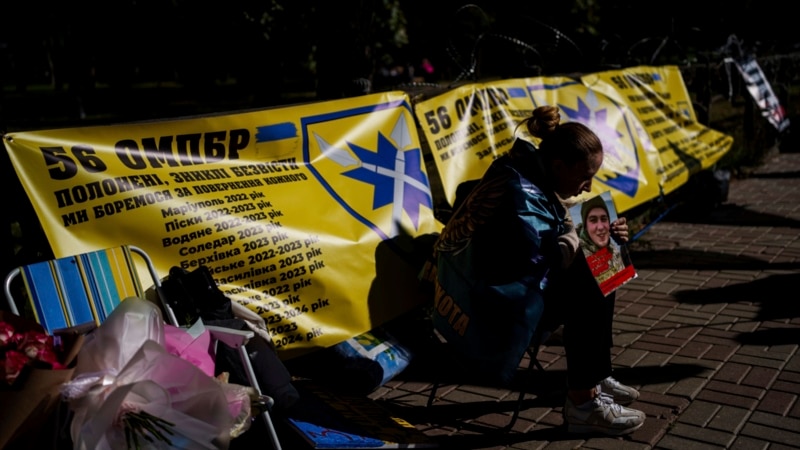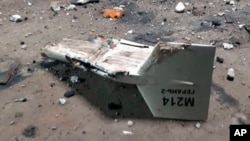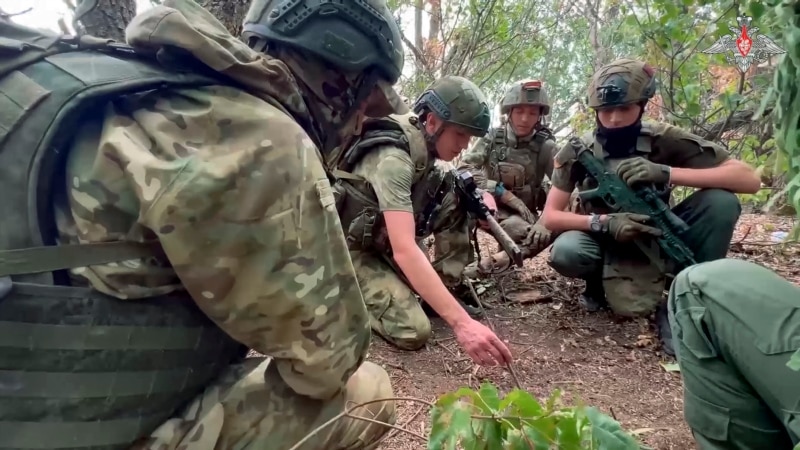For full coverage of the crisis in Ukraine, visit Flashpoint Ukraine.
The latest developments in Russia’s war on Ukraine. All times EDT.
4 a.m.: Prosecutors for International Mobile Justice teams are investigating as possible war crimes the ongoing Russian missile strikes in Kyiv and cities across Ukraine that have so far killed at least 26 people, an official told Reuters on Wednesday.
Monday’s attacks killed 19 people, wounded more than 100 and knocked out power across the country in Moscow’s biggest aerial offensive since the start of its invasion on February 24.
Another series of strikes yesterday killed seven people in the southeastern town of Zaporizhzhia and left part of the western city of Lviv without power.
War crimes investigators visited sites in the capital and examined damage to civilians and civilian infrastructure, said British attorney Nigel Povoas, lead prosecutor for the International Mobile Justice teams, which is assisting Ukrainian investigations.
“We visited all the sites in Kyiv yesterday,” Povoas told Reuters.
“Even the claimed widespread attacks on energy and communications infrastructure appear to have minimal impact on military operations and maximum impact on the health, suffering and spread of terror within the civilian population with winter approaching.”
Russia denies targeting civilians in its military operation in Ukraine.
3:45 a.m.: The recently restored power line supplying the Russian-occupied Zaporizhzhia nuclear power plant in Ukraine has been cut again, forcing the plant to switch to emergency diesel generators, the U.N. atomic watchdog chief Rafael Grossi said on Wednesday.
“Our team at #Zaporizhzhya Nuclear Power Plant informed me this morning that the plant has lost all of its external power for the 2nd time in five days,” Grossi said on Twitter, renewing his call for a protection zone around the plant to prevent shelling near the facility.
3:30 a.m.: Poland’s PKN Orlen said on Wednesday that oil supplies to its Plock refinery were not interrupted as a result of a leak detected in the Druzhba pipeline, Reuters reported.
Polish operator PERN has detected a leak in one of the pipelines in the Druzhba system that carries oil from Russia to Europe, it said on Wednesday. Poland said it was probably caused by an accident, although the event may still stoke concerns about the security of Europe’s energy supplies.
The discovery of the leak in the main route carrying oil to Germany, which operator PERN said it found on Tuesday evening, comes as Europe faces a severe energy crisis in the aftermath of Moscow’s invasion of Ukraine which has cut supplies of gas in a continuing stand-off.
“Here we can talk about accidental damage,” Poland’s top official in charge of energy infrastructure Mateusz Berger told Reuters by telephone. He said there were no grounds to believe the leak was caused by sabotage.
PERN said in a statement that at this point the exact causes of the leak were unknown. It was detected in a section of the pipe around 70 kilometers from the central Polish city of Plock.
A PERN spokesperson declined to give further details.
The Druzhba oil pipeline, whose name means “friendship” in Russian, is one of the world’s largest, supplying Russian oil to much of central Europe including Germany, Poland, Belarus, Hungary, Slovakia, the Czech Republic and Austria.
3:15 a.m.: Russia’s Gazprom said on Wednesday it will ship 42.4 million cubic meters of natural gas to Europe via Ukraine on Wednesday, a volume in line with recent days, Reuters reported.
3 a.m.: Ukraine has received the first Iris-T defense system from Germany, Ukrainian Defense Minister Oleksiy Reznikov has said, according to Agence France-Presse.
“IRIS-Ts from (Germany) are already here. (American) NASAMS are coming. This is only the beginning. And we need more,” Reznikov tweeted late on Tuesday. “There is a moral imperative to protect the sky over (Ukraine) in order to save our people.”
Germany had promised delivery of the first Iris-T missile shield “in the coming days” after Russia unleashed deadly attacks across Ukraine on Monday, killing at least 19 people and wounding more than 100, according to Ukrainian authorities.
The Ukrainian defense ministry said Monday that Russia had fired 83 missiles at Ukraine, of which its air defenses shot down 52, among which were 43 cruise missiles.
2:30 a.m.: Desperate to avoid military call-up to fight in Ukraine, more than 20 Russians have sailed in yachts from North Pacific ports to South Korea, but most have been refused entry, according to a media report.
There has been an exodus of conscription-age men from Russia since President Vladimir Putin ordered a partial mobilization on September 21, but most fled by road, rail and air to Europe, and neighboring former Soviet Union countries, like Georgia, Azerbaijan and Kazakhstan.
On Tuesday, South Korean broadcaster KBS reported that at least 21 Russians had arrived aboard yachts at ports in the south of the country, but only two had been granted entry, while others were refused as authorities deemed their purpose “ambiguous.”
A yacht with five Russian men aboard departed on Tuesday from the South Korean island of Ulleung, having arrived there on September 30 after sailing from the eastern Russian city of Vladivostok, a coast guard official told Reuters on Wednesday.
The official said the yacht was “taking cover from bad weather” and the people aboard had received food and other aid, but he declined to specify why they were not granted entry, referring immigration-related queries to the justice ministry.
KBS reported that three yachts had docked in the southeastern port city of Pohang over the past several days, mostly carrying Russian men in their 20-30s. One of the yachts had nine Russian men and one woman aboard, while a smaller vessel had four men aboard, it said.
An official at Pohang’s coast guard declined to comment when contacted by Reuters. A justice ministry official said he did not have details about the yacht cases, but Russians are in general allowed to enter the country without a visa as long as they obtain prior approval via South Korea’s electronic travel authorization system.
2:15 a.m.: Russia’s Federal Security Service, or the FSB, said on Wednesday that it had detained five Russians and three citizens of Ukraine and Armenia over the explosion that damaged the Crimea Bridge last Saturday, Reuters reported citing Russia’s Interfax.
The FSB said the explosion was organized by the Main Intelligence Directorate of the Ukrainian Defense Ministry, and its director Kyrylo Budanov.
Ukraine has not officially confirmed its involvement in the blast, but some Ukrainian officials have celebrated the damage.
The explosion on the twelve-mile-long bridge destroyed one section of the road bridge, temporarily halting road traffic. It also destroyed several fuel tankers on a train heading towards the annexed peninsula from neighboring southern Russia.
The bridge, a prestige project personally opened by Russian President Vladimir Putin in 2018, had become logistically vital to his military campaign, with supplies to Russian troops fighting in south Ukraine channeled through it.
Russian forces launched mass missile strikes against Ukrainian cities, including power supplies. At a televised meeting of Russia’s Security Council on Monday, Putin said the strikes were a retaliation for the Crimea bridge blast, which he said had been organized by Ukraine’s secret services.
Agence France-Presse also reported saying that eight suspects have been detained over the bridge explosion.
2 a.m.:
1:30 a.m.: The European Union’s energy commissioner hailed a “long-term strategic partnership” with Algeria as the bloc turns to Africa’s biggest gas exporter to fill a gap left by Russian supplies, Agence France-Presse reported.
Kadri Simson made the remarks Tuesday and is the latest in a string of top European officials to visit Algeria in search of more natural gas since Russia cut supplies to Europe in suspected retaliation against Western sanctions after Moscow’s invasion of Ukraine.
Algeria has helped Europe diversify its energy supplies by pumping more gas to Italy, which in July signed a deal to import billions more cubic meters via an undersea pipeline from the North African coast.
Algerian Prime Minister Aimene Benabderrahmane said state hydrocarbons firm Sonatrach had put in place an “accelerated program” to bump up output.
1:15 a.m.: Five blasts were heard in the city of Kherson early on Wednesday, Reuters reported citing Russian media, adding that according to unofficial information air defense systems were launched.
Kherson, the administrative center of the broader Kherson region, was one of the first cities to fall to Russian forces after they launched their invasion in Ukraine in February.
Earlier on Wednesday, Ivan Fedorov, the exiled mayor of Russian-controlled Melitopol in the south of the Zaporizhzhia region, said on the Telegram messaging app that there was a powerful explosion in the city.
RIA reported, citing local Russia-installed police, that a device exploded near the city’s central market. There were no casualties, RIA reported.
Reuters was not able to immediately verify the reports.
1 a.m.: Spain’s Cabinet approved a new energy-saving plan that aims to cut the country’s natural gas consumption by up to 13.5% by March, Agence France-Presse reported, as part of Europe’s efforts to reduce its dependence on Russian supplies.
The plan announced Tuesday includes new tax breaks on renewable energy and financial incentives to encourage more households to use solar panels and install smart meters, the energy ministry said in a statement.
It also includes measures to increase by 18% Spain’s ability to send gas by pipeline to France across the Pyrenees mountain range, and an expansion in loading capacity for boats carrying gas to other EU countries, among them Italy.
The EU has asked member states to cut gas use from August to March by up to 15%, although for some countries less exposed to Russian energy dependence the figure is lower.
12:30 a.m.: U.S. President Joe Biden told CNN during an interview broadcast on Tuesday that he did not think Russian President Vladimir Putin would use a tactical nuclear weapon in the war with Ukraine.
Biden, asked by CNN anchor Jake Tapper how realistic he believed it would be for Putin to use a tactical nuclear weapon, responded: “Well, I don’t think he will.”
12:15 a.m.: Leaders of the Group of Seven wealthiest nations say they will support Ukraine for “as long as it takes” following Russia’s major missile strikes earlier this week. Western allies are expected to decide soon whether to approve Ukrainian President Volodymyr Zelenskyy’s request for more modern and effective air defense systems. VOA’s White House bureau chief Patsy Widakuswara has the latest.
12:05 a.m.: Ukraine’s defense minister is set to brief the latest meeting of the U.S.-led Ukraine Defense Contact Group in Brussels on Wednesday, with NATO defense ministers also meeting there to discuss how to support Ukraine in its battle against a Russian invasion.
NATO Secretary General Jens Stoltenberg told reporters Tuesday that the talks will provide an opportunity for Ukraine to present a list of what it needs and see how that matches up with what partner countries can provide.
Stoltenberg said the talks would be about both what types of aid to send to Ukraine and ensuring prompt delivery along with training.
Leaders of the Group of Seven major industrial nations, meeting Tuesday in a crisis video conference with Ukrainian President Volodymyr Zelenskyy, pledged Tuesday they “will stand firmly with Ukraine for as long as it takes” after Russia continued its barrage of missile attacks on Ukrainian cities.
The G-7 leaders said in a statement after the virtual meeting that they had reassured Zelenskyy they are “undeterred and steadfast in our commitment to providing the support Ukraine needs to uphold its sovereignty and territorial integrity.” They said Moscow’s “indiscriminate attacks on innocent civilian populations constitute a war crime.”
Some information in this report came from The Associated Press, Reuters and Agence France-Presse.

